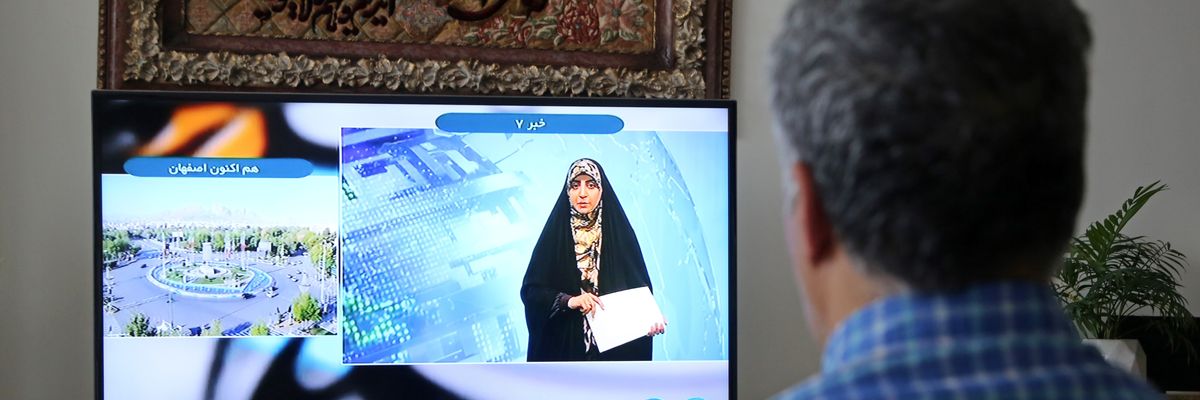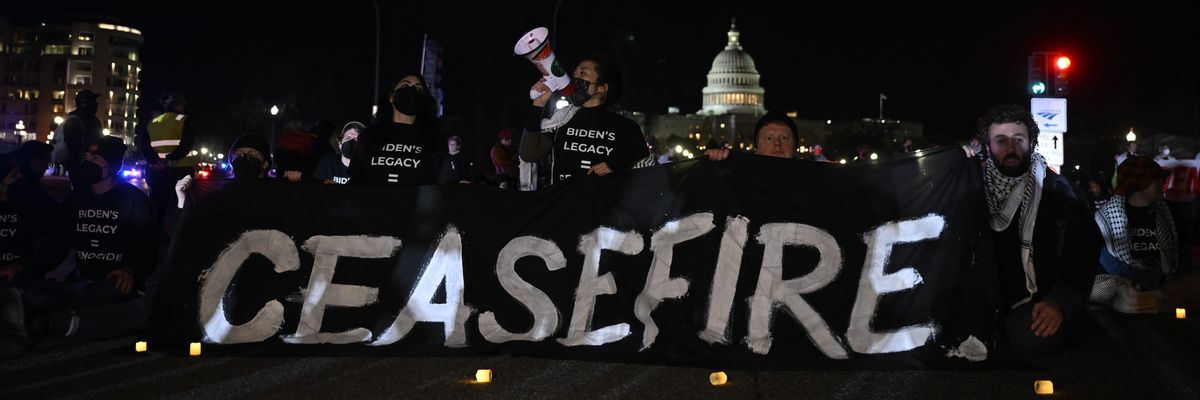(TEDGlobal 2014 transcript)
Why privacy matters
Glenn Greenwald was one of the first reporters to see — and write about — the Edward Snowden files, with their revelations about the United States' extensive surveillance of private citizens. In…
Awareness | Debate | Action
Elevate your social consciousness and become the problem that forces change

In 2004, I was a single mom raising three daughters on my own. I worked three jobs, including an overnight shift as a translator at our local hospital, to make ends meet. Every time I stood in line at the supermarket, I worried about what I would have to put back on the shelf to stay within our weekly $100 food budget.
My daughters are all grown now. But whenever I’m buying groceries, I still get that horrible feeling in the pit of my stomach as I remember not knowing if we would have enough to eat, and how much—or how little—I could provide for my family with $100.
Prices for all of us have gone way up since Covid-19, and $100 now buys about $65 worth of groceries compared to five years ago. This puts a huge bite on working families, because we spend most of our income every month—as much as 90%—on food and other necessities. So when prices rise, we hurt the most.
Time and again, big companies tell us that if they could only get bigger, they would pass savings on to consumers. This is almost never true.
Big corporations tell us that policies and supply chains are to blame for rising costs, but there’s a big part of the story they don’t want you to know: These giant corporations are themselves largely responsible for higher prices.
According to a new report by the Federal Trade Commission, the largest grocery retailers—which include Walmart, Kroger, and Amazon, which owns Whole Foods—used the pandemic as an excuse to raise prices across the board. The same is true for big agribusinesses like Tyson Foods and DuPont, which sell the lion’s share of meat products and seeds.
These giant companies wrote themselves a blank check during Covid-19, which they now expect us to pay for.
What all of these corporations have in common is they always want to get bigger. Why? Because when consumers have fewer choices, corporations can force us to pay higher prices. This is especially true with food, which none of us can live without. And according to the FTC, a big reason for these higher prices is corporate greed.
Time and again, big companies tell us that if they could only get bigger, they would pass savings on to consumers. This is almost never true. Instead, they give money back to their investors and reward executives—like Walmart’s Doug McMillon, who takes home over $25 million a year, and Kroger’s Rodney McMullen, who makes more than $19 million. That’s 671 times more than the amount an average Kroger’s worker makes.
Corporate consolidation can have deadly consequences. In healthcare, which my organization tracks closely, we see that the domination of private insurance by a handful of companies—Aetna, United Healthcare, and Cigna—leads to bigger bills, worse health outcomes, and lost lives.
The profits of retailers and agribusinesses have now risen to record levels, as much as five times the rate of inflation. How do companies like Tyson Foods, Kroger, and Walmart boost profits? The way they always do: by raising prices, while 65% of Americans live paycheck to paycheck.
No American should ever have to work three or more jobs just to survive: not in 2004, 2024, or 2044. We want a world in which every one of us has what we need not only to live, but also to dream. Identifying who is behind the rising cost of everyday essentials is a necessary first step.

Israel’s April 1 attack on Iranian diplomatic facilities in Damascus, Syria, and Iran’s retaliatory attack on Israel less than two weeks later has resulted in no winners—and has raised concerns over a wider, more disastrous war. Fortunately, Israel’s response early in the morning April 19, which was apparently discussed with Washington prior to launching that attack, was extremely limited. So far, the administration’s response has been muted and there are hopes that there will be no further escalation on either side.
Both Israel and Iran are playing a dangerous game, however, and there are unconfirmed reports that, in return for Israel agreeing not to launch a major war on Iran, the United States would okay a massive Israeli attack on the city of Rafah in the Gaza Strip, where over 2 million residents and internally displaced Palestinians are crowded into an area of less than 25 square miles.
The initial Israeli attack killed top commanders of the Quds Force, the notorious foreign operations arm of Iran’s Revolutionary Guard, which have led Iran’s proxy forces in Syria and Iraq and have worked closely with the Lebanese Hezbollah. Although there are certainly victims of Iranian military operations who are not sorry for the commanders’ demise, diplomatic facilities are, legally speaking, the sovereign territory of the country they represent. Israel’s attack on the Iranian consulate in Damascus was, therefore, an attack on Iran.
When the primary Middle East conflict is seen as Israel versus Palestine, most people—even in the United States—are more sympathetic to the Palestinians. If it is seen as Israel versus Iran, there is greater sympathy for Israel.
While the Biden administration and congressional leaders have roundly condemned Iran’s strikes against Israel, virtually none seem to acknowledge that Israel struck first. This is particularly ironic in light of the U.S. obsession with Iranians violating the sanctity of U.S. diplomatic facilities when a state-sanctioned mob seized the United States Embassy in Iran in 1979. Even though they illegally held American hostages for 444 days, no one was killed.
For decades, Israel has been engaged in a shadow war with Iran, which—despite being more than 600 miles from Israel—has emerged as its most dangerous adversary. Assassinations of Iranian military leaders, intelligence officials, and nuclear scientists, cyberwarfare, and other attacks, were met with both inflammatory rhetoric from Iran, as well as support for Hezbollah and other militant groups that would occasionally engage in military confrontations with Israel.
Despite all this, Iran never attacked Israel directly—until now. The unprecedented action by Iran this past weekend was the first time any state has attacked Israeli soil since Iraq lobbed 42 Scud missiles into that country during the 1991 Gulf War. And, for the first time, U.S. forces have directly intervened in support of Israel in a military confrontation, shooting down a number of cruise missiles bound for Israel while they were flying over Jordanian and Iraqi airspace.
The highly nationalistic Iranian public, despite becoming increasingly alienated from their repressive regime, appears to be largely supportive of their government finally striking back after months and years of Israeli provocations. This confrontation unfortunately appears to have therefore strengthened the regime.
Iran, Hezbollah, and allied groups have no interest in taking on Israel in a full-scale war where they would face massive destruction by Israel’s vastly superior military forces. Iran has hundreds of powerful ballistic missiles it could have sent into Israel with devastating results, yet it chose to primarily launch drones and cruise missiles, knowing they would be mostly intercepted. Their targets included Israeli military installations, not major cities. Iran has made clear that this attack was the country’s only act of retaliation and that it would not attack Israel again unless it was attacked first.
Similarly, Israel has been bombing Hezbollah targets in Lebanon and Syria repeatedly since October, resulting in large numbers of casualties, only to be met with no more than an occasional rocket fired into northern Israel creating minimal damage, while Hezbollah keeps its own sizable arsenal of missiles in reserve.
During the past six months, Iran and its extremist allies have been winning politically by simply holding back and watching the Islamic world become increasingly radicalized. This occurs as people witness Israel’s ongoing slaughter of Muslims in Gaza with the support of the United States and other Western nations. A broader military conflict would do them little good.
Israel, by contrast, very much wants a confrontation with Iran. When the primary Middle East conflict is seen as Israel versus Palestine, most people—even in the United States—are more sympathetic to the Palestinians. If it is seen as Israel versus Iran, there is greater sympathy for Israel. Hence, it is in Israel’s interest to provoke a confrontation with Iran and, for the sake of the Palestinians, it’s important for Iran not to take the bait.
We have seen how, in the days since Iran’s attack on Israel, there has been little attention given to Israel’s ongoing bombing of civilian targets in Gaza. None of the 70,000 tons of explosives dropped on crowded urban areas since October 7 were intercepted. Nor has there been much attention on Israel’s illegal blocking of necessary food aid and the resulting starvation. Nor have there been any more protests in Israel by supporters of the hostages pressing Israeli Prime Minister Benjamin Netanyahu to make the necessary compromises for their release.
In the United States, Biden administration officials and Democratic congressional leaders—who were finally appearing to be getting bolder in their criticism of Israeli war crimes in Gaza—have been largely silenced and are, instead, underscoring their “ironclad” commitment to Israel. Meanwhile, Republicans, along with Democratic hawks, are trying to blame even the timid expressions of disapproval regarding Israeli atrocities and calls to condition offensive military aid, as somehow emboldening Iran to attack.
While the recent confrontation has brought President Joe Biden closer to Israel, his administration has made clear its objections to Israel going to war with Iran—insisting that while Washington was still committed to defending Israel from attack, the United States would not participate in any military actions targeting Iran. They recognize that a broader war would open U.S. forces in the region to attacks by Iran and its allied militias. It could also very likely interrupt shipping in the Persian Gulf, the source of a large percentage of the world’s oil, thereby having a devastating impact on the global economy.
Despite this, there are those in Congress who would like to see the United States join Israel in a war against Iran, even if Israel initiates it. As far back as 2013, a large bipartisan majority in the Senate went on record in 2013 calling on the United States to provide military support for Israel in case it is “compelled to take military action.”
Still, Biden is likely to apply Washington’s considerable leverage on Israel to prevent an all-out war with Iran, since he recognizes how it would harm U.S. interests. It is unfortunate that he still refuses to apply that same leverage to prevent Israel from its ongoing slaughter of Palestinian civilians in Gaza.

How do we break the cycle of violence?
As a local healing arts facilitator, trauma survivor, and Jewish activist, this question never leaves my mind.
Long before I dreamed of joining a mass action to block President Joe Biden’s motorcade route to his State of the Union address—or of co-organizing the 25 Mile March for Palestine—I was committed to understanding collective trauma, healing, and liberation.
You see, I grew up poor, white, and Jewish. The formative experiences of my childhood, including food insecurity, sexual violence, and antisemitism, left me with an intimate awareness of the human capacity for violence. Though this was normalized within the fabric of my everyday life, I always felt that so much more was possible. Only after my escape would I go through the painful and transformative process of learning what it actually meant to be a survivor, what it meant to have a voice, and what it meant to be free.
I am calling for the safety and freedom of all people, and an end to sexual violence, through an immediate and permanent cease-fire, the release of all hostages, unhindered humanitarian aid to Gaza, and a cessation of U.S. weapons sales to Israel.
Through this process, I uncovered trauma histories of my family lineage. I also learned to see my identity beyond victimhood by connecting with others who had experienced different forms of oppression and violence. I began to trace the familiar shapes of our silencing. I began to track the impact of mainstream narratives, including the stark dichotomy between victim and perpetrator, and how the assumptions of absolute innocence and evil that accompany these terms dehumanize all parties. When experiences of victimization become core to an individual or group’s identity, there is grave danger of being unable to grasp one’s sense of agency or impact. Indeed, I began to realize, victims can become perpetrators.
Following the shocking attack on October 7, allegations abounded that Hamas systematically sexually abused and mutilated Israeli women. As a survivor who deeply believes and loves other survivors, I immediately grieved alongside all who had been violated. My commitment to Palestinian liberation could never exclude my grief for the Israeli civilians who had been targeted. Yet, as further evidence surfaced, my heart broke open yet again: It became apparent to me that survivor voices were not at the center.
For example, the seminal New York Times article published in late December entitled “Screams Without Words: How Hamas Weaponized Sexual Violence on October 7” was revealed to be wholly lacking in evidence for its sweeping claims. The United Nations has since released a special report clarifying that two of the most widespread allegations regarding sexual violence were groundless. The report also named that there were reasonable grounds to believe that incidents of sexual violence occurred on October 7. However, Israel has continued to disallow a full-fledged investigation by the U.N., while repeatedly using the specter of systematic sexual violence in Israeli and U.S. mainstream media to justify the genocide and ethnic cleansing of Palestinian men, women, and children.
Governments are so quick to act out of vengeance, but so slow to listen to the voices of survivors themselves. Many of us do everything within our power to find the truth beneath the rubble. Many of us plead that our society looks at the root causes of violence, ranging from intergenerational trauma to occupation, from racism to the pervasive denial of humanity. Many of us organize for systemic change and transformative justice practices that acknowledge the humanity of everyone who commits—and is impacted by—violence. Many of us break into pieces each time another child is killed before our eyes. Many of us scream: “Not in our name!” Many of us demand access to substantive healing resources for survivors everywhere, including the time to breathe and rest, and the support to tell our own stories.
While elected officials invest our tax dollars in deadly weapons, the actual demands and dreams of those who have been raped, traumatized, and brutalized by individual and communal acts of violence are forgotten. We know that the Israeli military has been documented sexually assaulting Palestinian civilians and prisoners throughout the occupied territories, even as such stories rarely make the headlines. State violence creates the conditions for sexual violence, and the resulting wounds are felt for generations.
In healing my sense of agency as a survivor, I have learned to recognize my privilege and power, and to see that I too have the capacity to commit acts both of harm and of healing. As an American Jew, I am compelled to embrace the power of my own voice, and refuse complicity with collective violence. I am calling for the safety and freedom of all people, and an end to sexual violence, through an immediate and permanent cease-fire, the release of all hostages, unhindered humanitarian aid to Gaza, and a cessation of U.S. weapons sales to Israel. Anything less would be a denial of my own humanity.
 While former President Donald Trump spent much of his week in court, President Joe Biden visited the swing state of Pennsylvania for three days and gave speeches in Scranton, Pittsburgh and Philadelphia. We flagged some false and misleading claims, including several common talking points.
While former President Donald Trump spent much of his week in court, President Joe Biden visited the swing state of Pennsylvania for three days and gave speeches in Scranton, Pittsburgh and Philadelphia. We flagged some false and misleading claims, including several common talking points.
The post FactChecking Biden’s Swing-State Stops in Pennsylvania appeared first on FactCheck.org.
 During the April 8 eclipse, people in the path of totality were able to see solar phenomena, including the sun's corona. But social media posts have shared altered or composite images of these phenomena, claiming one image was "captured by NASA." It was actually an artist's rendering of a composite photo of the 2017 eclipse.
During the April 8 eclipse, people in the path of totality were able to see solar phenomena, including the sun's corona. But social media posts have shared altered or composite images of these phenomena, claiming one image was "captured by NASA." It was actually an artist's rendering of a composite photo of the 2017 eclipse.
The post Posts Misrepresent Views of Eclipse With Composite Images appeared first on FactCheck.org.
 On the day of the tax filing deadline, former President Donald Trump went on Truth Social to misleadingly warn that if President Joe Biden is reelected, "you will soon be facing colossal tax HIKES." But in his latest budget proposal, Biden supports extending the tax cuts championed by Trump for people making less than $400,000.
On the day of the tax filing deadline, former President Donald Trump went on Truth Social to misleadingly warn that if President Joe Biden is reelected, "you will soon be facing colossal tax HIKES." But in his latest budget proposal, Biden supports extending the tax cuts championed by Trump for people making less than $400,000.
The post Trump’s Unfounded ‘Colossal’ Tax Hike Warning appeared first on FactCheck.org.
Are you interested in how you impact the rest of the world, or how others impact the world thereby affecting you? Do you want to do something to improve things? ... About Us
Objective journalism on the struggles of democracy in a socially stratified society.
Added by Cromag 0 Comments 0 Likes
Added by Cromag 0 Comments 0 Likes
Added by Cromag 0 Comments 0 Likes
For people with COPD, Multiple Chemical Sensitivity, and Asthma, Chemically Scented Products can be a major Disability Barrier. Just a quick surf on the internet shows how many people are unable to…Continue
Started by Melva Smith in Sample Title Aug 9, 2011.
Dear Fellow Activists. What do you all think about a scent-free Olympics? If you or someone you know finds scented products to be a disability barrier, you might be interested in knowing that there…Continue
Tags: COPD, Sensitivity, Allergy, Sports, barriers
Started by Melva Smith in Sample Title Jun 21, 2011.
I've been active now in a concerted way for many years, and I've worked on a number of causes and with many different people. Most of these relationships have been very positive. Activists are…Continue
Tags: organizing, activism, Ethics
Started by Cromag in Uncategorized. Last reply by Ice Goldberg Oct 21, 2009.
Posted by Cromag on December 22, 2016 at 9:08pm 0 Comments 0 Likes
A new movement is working to protect our environment through the recognition of its fundamental rights. It’s an idea whose time has come.
By Mari Margil from December 20, 2016, 4:39 pm – 8 MIN READ… ContinuePosted by Cromag on December 4, 2016 at 1:00pm 0 Comments 0 Likes
 The plastic and paper bag law is ostensibly environmental legislation in hopes that a small fee will diminish the environmental impact of single-use merchant bags. It was possible to have the fee go into an environmental fund to help with diminishing the impact, but that was voted down by CA Prop 65. The resulting declining of Prop 65 is essentially saying that we cannot force the…
The plastic and paper bag law is ostensibly environmental legislation in hopes that a small fee will diminish the environmental impact of single-use merchant bags. It was possible to have the fee go into an environmental fund to help with diminishing the impact, but that was voted down by CA Prop 65. The resulting declining of Prop 65 is essentially saying that we cannot force the…
Posted by Cromag on May 22, 2016 at 9:55am 0 Comments 0 Likes
via Independent Science News | by Jonathan Latham, PhD
 Piecemeal, and at long last, chemical manufacturers have begun removing the endocrine-disrupting plastic…
Piecemeal, and at long last, chemical manufacturers have begun removing the endocrine-disrupting plastic…
Posted by Cromag on March 15, 2015 at 12:30pm 0 Comments 0 Likes
Just because food is labeled organic doesn't mean it's what you're expecting, journalist Peter Laufer tells Salon
Published Saturday, Jul 19, 2014 11:00 AM PST…
ContinuePosted by Cromag on October 23, 2014 at 2:51pm 0 Comments 0 Likes
... "So what would a radically different law-driven consciousness look like?” The question was posed over three decades ago by a University of Southern California law professor as his lecture drew to a close. “One in which Nature had rights,” he continued. “Yes, rivers, lakes, trees. . . . How could such a posture in law affect a community’s view of…
Posted by Cromag on October 15, 2014 at 12:30pm 0 Comments 0 Likes
(TEDGlobal 2014 transcript)
Why privacy matters
Glenn Greenwald was one of the first reporters to see — and write about — the Edward Snowden files, with their revelations about the United States' extensive surveillance of private citizens. In…
Posted by Cromag on March 4, 2014 at 1:00pm 0 Comments 0 Likes
By Chris Hedges March 2nd, 2014
OXFORD, England—The morning after my Feb. 20 debate at the Oxford Union, I walked from my hotel along Oxford’s narrow cobblestone streets, past its storied colleges with resplendent lawns and…
ContinuePosted by Cromag on February 28, 2014 at 3:24pm 0 Comments 0 Likes
We live in an interdependent world, where nations are increasingly…
Posted by Cromag on February 22, 2014 at 6:00pm 0 Comments 0 Likes
Reactions to Anatomy of a Deep State from the Bill Moyers Show
February 2014 - Credit: Dale Robbins
The notion of the “Deep State” as outlined by…
ContinuePosted by Cromag on January 27, 2014 at 8:00am 0 Comments 0 Likes
A specter is haunting the French humanist mind these days--a radical ecology movement that threatens to replace the idealization of humanity with an idealization of nature. Already we see "the passing of the humanist era," writes Luc Ferry, a philosopher at the Sorbonne and the University of Caen, in this prize-winning critique of that movement, a book all environmentalists ought to read. It…
1 member
1 member
2 members
|

© 2024 Created by Cromag.
Powered by
![]()